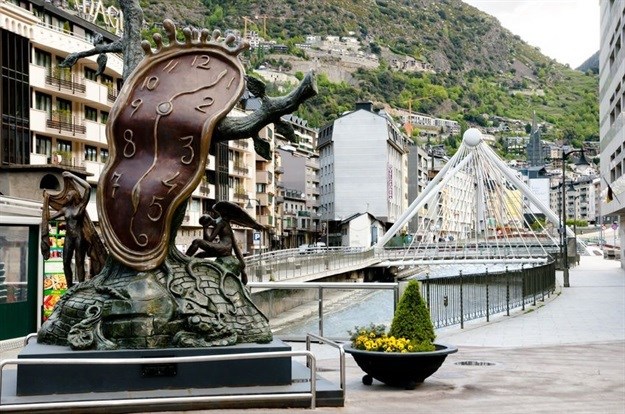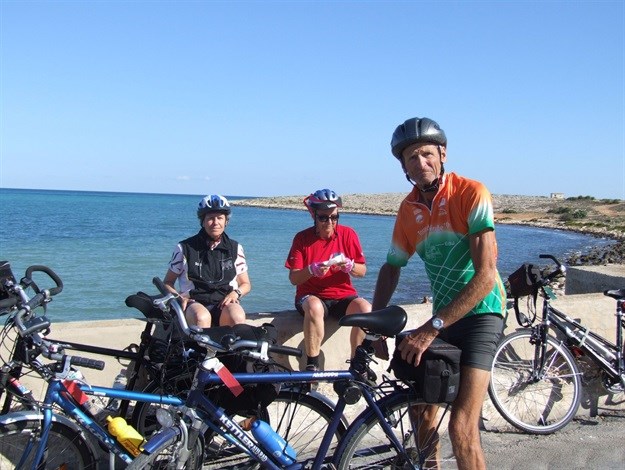
Perhaps because of the heat, perhaps because of the quieter rhythm of village life or perhaps it’s just something in the water, I am convinced that time passes differently here. In South Africa, it was a commonplace to say, “I can’t believe how time has flown!” whereas in Malta, time hasn’t even left the nest yet! There is no recency to what happened yesterday – it feels like it was a week ago, and last week feels like last month. The fact that we have been living here a year feels instead like I have been on the island for a decade. This prolonging of day-to-day experience, the humid torpor of the Maltese existence has generated a distortion of memory which brings to mind the ‘Dali-esque’ image of melting clocks...
This extraordinary sense of the extension of time has its echo in Eurostat figures for healthy life years in the EU. Health is an important priority for Europeans, who expect to have a long and healthy life, to be protected against illnesses and accidents and to receive appropriate healthcare.

Whether extra years of life gained through increased longevity are spent in good or bad health is a critical question. Since life expectancy at birth is not able to fully answer this question, indicators of health expectancies, such as disability-free years, have been developed. These focus on the quality of life spent in a healthy state rather than the quantity of life (longevity).
I was thus intrigued to find Malta at the top of the EU-28 leaderboard for healthy life years (at birth) and second after Sweden for additional healthy life years (when calculated from age 65).
If you were born in Malta, your number of healthy life years (excluding disability) is 72 years. This is more than a decade longer than the EU average, where healthy life years is 61. (‘Unhealthy’ life years add an additional 21% for men and 26% for women.) Life expectancy for women in the EU-28 was on average 5.5 years longer than that for men in 2014. However, most of these additional years tend to be lived with activity limitations. Indeed, the gender gap was considerably smaller in terms of healthy life years than it was for overall life expectancy – at just 0.4 years difference in favour of women. Men therefore tend to spend a greater proportion of their somewhat shorter lives free from activity limitations.
The picture improves even further from the Maltese perspective when healthy life years are tabulated at age 65. Here, we islanders get a further 13.5 years of the good life, that is free from activity limitations. Who wants to live forever – indeed!
I was reminded of the 65-plus demographic when the Malta Communications Authority (MCA) survey into mobile usage was released this month.
One of the curiosities about living on the archipelago is the state of cellular telephony, by which I mean handsets. Whereas smartphones are ubiquitous in South Africa, here you mostly see them in tourists’ hands or on the tables of coffee shops where Maltese professionals are taking an informal meeting or mid-morning break. When you are in the villages and closer to the natural rhythms of island life, old-school handsets (remember the Nokia brick?) are very much in evidence. At least one in three contracts hasn’t seen a handset upgrade or upsell in many years.
According to the MCA survey, 3% of the population haven’t adopted cell phones, either because they found no need for a mobile connection or considered that using a mobile handset was too complicated. (Not surprisingly, most of the 3% were aged over 65.)
The complications of mobile phones determined a number of other findings. For example, only 2 out of every 3 mobile users has a smartphone, and half of the ones that prefer to stick to a standard set said it was because smartphones were too complicated and that their existing handset did all they needed it to do. And once again, 50% of these respondents were over 65.
When it comes to choosing a provider, 54% cited good customer care service as an essential factor. A third said that their choice depended on the perceived value for money and the choices made by family and friends.
4 out over every 5 on a pre-paid plan reported an average monthly financial outlay of less than €20 (R300) per month. Just 29% of respondents on a post-paid plan reported a similar outlay, while 47% reported paying over €20 per month for their mobile services. (In Malta, the cheapest entry-level cellular contract at Vodafone is the €20 Pop Star package.)
Half of the survey respondents with a mobile subscription use OTT-based activities (like WhatsApp or Messenger) – 4 out of every 5 of them on a daily basis. Almost all of these saying they consider messaging services such as WhatsApp and Messenger as substitutable to traditional SMS services.
If on this last point alone about SMS substitution, Malta is probably very similar to South Africa.
